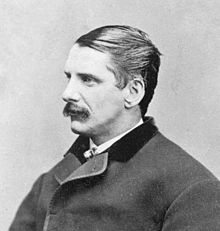Edward Dicey
| Edward Dicey | |
|---|---|

Edward Dicey in 1865
|
|
| Born |
Edward James Stephen Dicey 15 May 1832 Leicestershire, England |
| Died | 7 July 1911 (aged 79) London, England |
| Education | King's College, London, Trinity College, Cambridge |
| Occupation | Author, journalist and editor |
| Spouse(s) | Anne Greene Chapman (1867-1878) |
| Children | One son |
| Relatives |
A. V. Dicey (brother) Sir James Stephen (uncle) James Fitzjames Stephen (cousin) Leslie Stephen (cousin) |
Edward James Stephen Dicey (15 May 1832 – 7 July 1911) was an English writer, journalist, and editor.
He was born on 15 May 1832 at Claybrook, near Lutterworth, Leicestershire. He was the second son of Thomas Edward Dicey, of an old Leicestershire family, who was senior wrangler in 1811, was a pioneer of the Midland Railway, and owned the Northampton Mercury. His mother Anne Mary, was sister of Sir James Stephen; aunt of Sir James Fitzjames Stephen and Sir Leslie Stephen. His younger brother was Professor Albert Venn Dicey.
He was educated at home and, for about two years, at King's College, London. Edward went up to Trinity College, Cambridge, in 1850, was president of the Cambridge Union, and graduated B.A. in 1854 with a third class in the classical tripos, and as a senior optime in mathematics.
After leaving Cambridge he went for a short time into business without success, and then took to writing, for which he had inherited from his mother and her family a singular facility. He travelled abroad and interested himself in foreign politics. In 1861, he published both Rome in 1860 and Cavour a Memoir,. In 1862, Dicey visited America, and wrote on the American civil war in Macmillan's Magazine and the Spectator. In 1863 Six Months in the Federal States, 'met with a somewhat lukewarm reception,' on account of the northern sympathies of the author.
In 1861, Dicey became connected with the Daily Telegraph, and his style and knowledge of foreign questions led to his being made a permanent member of the staff in 1862. Among his colleagues were Sir Edwin Arnold, an old school friend, Francis Lawley, and George Augustus Sala. He was a leader-writer for the paper, and also acted as special correspondent in the Second Schleswig War, and the Austro-Prussian War.
...
Wikipedia
